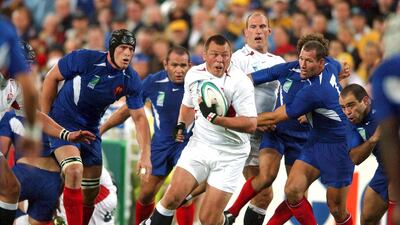A group of former internationals are planning legal action for negligence against the rugby authorities over brain injuries they have suffered, the law firm leading the action has announced.
Steve Thompson, a World Cup winner with England in 2003, is part of the group along with another former England player, Michael Lipman, and former Wales international Alix Popham, according to Rylands Law.
The planned action is against World Rugby, the Rugby Football Union and the Welsh Rugby Union, for "failure to protect (the claimants) from the risks caused by concussions".
The players have also created 15 'commandments' which they feel World Rugby should adopt to make the game safer.
Thompson, Lipman and Popham are part of a test group of eight players, but Richard Boardman from Rylands Law says he is representing more than 100 players whose ages range from their 20s to their 50s, many of whom are showing symptoms of neurological problems.
"The vast majority of the former players we represent love the game and don't want to see it harmed in any way," Boardman said.
"They just want to make it safer so current and future generations don't end up like them. This is why we're asking World Rugby to make a number of immediate, relatively low-cost changes.
"The obvious first step is for World Rugby, RFU and WRU to stop being in denial and acknowledge that there is a problem."
Thompson, 42, was diagnosed with early onset dementia and probable CTE (chronic traumatic encephalopathy) in November.
"I have no recollection of winning the World Cup in 2003, or of being in Australia for the tournament," said Thompson, who was based in Dubai for a spell after retiring from rugby and played for the Gulf Vets in the International Social competition at the Rugby Sevens tournament.
"Knowing what I know now, I wish that I had never turned professional. I went from working on a building site and training twice a week to training every day, sometimes twice a day.
"Many of those training sessions were contact sessions using a scrummage machine and I would be in the thick of things, with all the pressure pushed on me.
"It was not uncommon for me to be left dazed, seeing white spots and not knowing where I was for a few seconds, sometimes I would pass out completely. It was just an accepted part and parcel of training.
"I really wished that I had ended my career earlier, maybe my diagnosis might not be so bleak."

